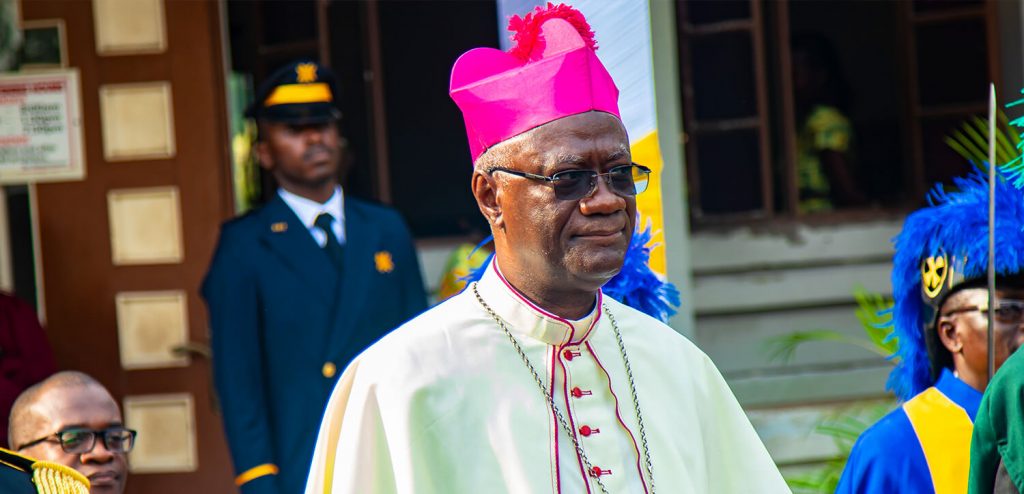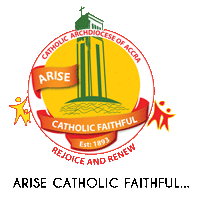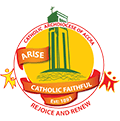
HOMILY BY MOST REV. PHILIP NAAMEH AT THE INSTALLATION OF MOST REV. JOHN BONAVENTURE KWOFIE, C.S.Sp. AS ARCHBISHOP OF ACCRA
Your Eminence Peter Cardinal Appiah Turkson, Prefect of the Dicastery for Promoting Integral Human Development, Your Excellency the Apostolic Nuncio to Ghana, Most Rev. Jean-Marie Speich, Honourable Chief of Staff representing H.E the president of the republic of Ghana Nana Addo Dankwa Akufo-Addo, my brother Archbishops and Bishops, bishops of sister Christian churches, Honourable Ministers of State, Honourable Members of Parliament, our Traditional Leaders, my dear Priests, the Superior General of the Congregation of the Holy Spirit, Very Rev. Fr. John Fogarty, other Superiors General of Religious Men and Women Congregations, Ladies and Gentlemen of the Media, Papal Knights and Dames, Dear people of God.
We have gathered this morning in this Holy Spirit Cathedral to give thanks to God for His goodness to us in many ways. The readings presented to us for our reflection from the Book of Jeremiah, talking about how God calls His people and exhorts them to rely on His strength in taking up their responsibilities, to an exhortation of these elders that God calls into service, to see their responsibility as one of humble service and not one of Lording it over the people.
In the Gospel, there is mention of Caesarea Philippi, it is mentioned because of its significance for not only the Jews but also the Greeks and the Romans. 20 miles North of the Sea of Galilee, this location had earlier been a place of Baal worship. In the Hellenistic period it was renamed Paneas because this was the very location where the god “Pan” was worshipped. In the Roman period after the death of Herod, his son Philip renamed it after himself and after the Emperor Tiberius Caesar. It is at this same location that the Romans destroyers of the Jerusalem temple, celebrated their victory. In the midst of what Matthew the Evangelist perceives to be a blind and recalcitrant Israel, precisely at this location, Jesus forms a new community of people characterised not by the expression of nationalistic or cultural identities but by two things; the first, the confession of faith in the true identity of Jesus and the second, by the service of charity which includes everyone especially the poor, the vulnerable, and the needy.
St. Paul tells us in Galatians 3:28 that in Christ Jesus, there is neither Jew nor Greek, slave nor freeman, male nor female. The two questions that Jesus asked His disciples, who do people say that the Son of Man is? and the second question, but you, who do you say that I am?”.
These are questions which still challenge all of us believers today to go beyond the gossip and popular opinion about Jesus to a personal commitment to His person as Son of God made man. We will see that a few verses after what we have listened to in the Gospel reading, Jesus takes time to school His disciples and His followers that being His follower is not to inspire any of them to look forward only for honours, prestige and lording it over others but that he himself the Son of Man was going to Jerusalem, He was going to be put to death and on the third day He will rise again. That means the identity of the Christian must involve also the ability to bear suffering in the course of witnessing to the truth. It’s not just any suffering but if you tell the truth, you live a virtuous life, you are bound to have people among you who will be troubled by this and they will inflict hatred on you.
Peter in his response: you are the Christ; the Son of the living God represents on the one hand all the disciples as their spokesperson. With all his strengths and weaknesses and therefore stands for the typical Christian. But on the other hand, Peter plays a unique and unrepeatable role, the Petrine office in which Bishops of the Catholic church share. Jesus Himself confers on Peter the title of being a rock, the foundation and leader of the new believing community which he had just established. Peter also receives from Jesus the keys of the kingdom of Heaven as well as to bind and to loose. This is the figure of the Holy Father the Pope as Leader and Head of the Catholic communion all over the world. Peter is told that the realm of the dead which no human being can conquer cannot overcome the church founded by Jesus under the leadership of Peter the rock. The Church may be under attacks by the powers of evil but may never be destroyed because it is founded on the rock.
The Pope in Collegiality with all the Bishops of the world, exercises his role as authoritative teacher and leader of the church in all matters of faith, discipline and doctrine. He also maintains in his person, a visible unity among all the faithful. One of the areas in which the Pope exercises his Petrine office, is in the appointment of Bishops worldwide through the Pontifical secret, the Pope appoints Bishops devoid of any interference from secular, political or even traditional leaders’ influence, even though at times, he finds it expedient to consult them.
In all of these, the care for the local Church and the salvation of souls always remains the key consideration in the appointment of Bishops. When the news about the transfer of Archbishop Charles Gabriel Palmer-Buckle was announced, it occupied the media for some time. Many questions were asked, “What has he done that he is being sent out of the capital? We have not seen this before”
The Holy Father wants you to see it. Similarly, when Most Rev. John Bonaventure Kwofie to the Metropolitan See of Accra, questions were also asked. For example, “If he can be an Archbishop, why did they not send him to Cape Coast and leave Archbishop Palmer-Buckle in peace in Accra? I am sure some of you heard this. In other words, “Western Region is closer to Central Region, why does he have to come all the way to Greater Accra?”. In the Catholic communion, there are no barriers between dioceses, preventing people from crossing over from one diocese to another.
The care of souls is a primary concern and the Pope decides when to do that. The transfer of Bishops is a normal thing in the Catholic Church especially in areas where the faith has taken deep root in the society. It is also an expression of the faith that all people even of different cultural affiliations belong together. We share the same common Creator and the one who created us wants us to be one communion.
These transfers therefore suggest that the Holy Father perceives the Catholic Church in Ghana as a Church come of age, a matured Church where Catholic communities open the doors to communion with everyone professing the same faith and committing itself to the service of charity to the benefit of all.
In this I will like to commend the priests of the Archdiocese of Cape Coast and that of Accra who accepted the new Archbishops, pledged their unflinching supports for them and educating the lay faithful to appreciate their trust in the faith maturity that the Holy Father is signalling in these transfers. It is a call to all Catholics in Ghana to dismantle the barriers that the ethnic affiliation imposes on people who are perceived not to belong to them.
The communion of the church under the Holy Father is a sign and a model for our secular society who build walls around certain units. The church, my dear brothers and sisters exists in a world in which financial and media globalisation is a great success but also one in which human and political globalisation has failed totally as nations and political institutions build walls around themselves to exclude others. I think we know the slogans at the time that when nations should easily come together because of the facility that modern technology has created for us, we still hear things like “America First”.
I am sure if our politicians have their way, they will also say something like “Ghana First”. But is that the will of God for us? Even on party political dimensions.
I will wish that the president of party A would have the courage to be inclusive for the welfare of the Ghanaian society by appointing members of party B, because of competence and the ability to contribute tremendously towards the building up of our nation.
I don’t know, am I saying too much? I think this is what the globalization in the church is a symbol of. The one society and which at this human and political level is truly a success in this globalization is the Catholic church and we have seen it in recent years after the short Pontificate of Pope John Paul I. We had Popes from Poland, from Germany, from Argentina and we have African Cardinals in Rome including our own about whom we are always very proud who are collaborating with the Pope in the governance of the universal church. My dear brothers and sisters, this tells us that this is not the time to say this person doesn’t belong here. The church with its faith as in the communion of all peoples stands as a challenge and a model of secular societies today.
My dear Archbishop John Bonaventure Kwofie, you have been a Bishop before and you must have done very well that is why they bring you to the capital so I think the media has done my work very well. Your biography and your ministry before this time has already been out there to educate the people about you. I will not need to repeat that. Suffice it to say that the main duties of a Bishop are also well known to you. Those of teaching the faith, sanctifying the people of God because the lay people, the priests and the religious together form the holy people of God and this responsibility reposes on the Bishop through his ministry to facilitate as much as possible their holiness. The tools for this are given to us. In the governance of the church we have every reason to say that we take a democratic model even though the church is hierarchical.
Why do I say this? All Bishops are exhorted to have a Laity Council in the diocese which should go down in all the parishes. These are areas where the opinion of our lay believers can be heard and be brought also into the governance where their competences are also used, their learning and also their own faith experience. Then we have a Pastoral Council which is also statutory in the administration of every diocese. This consists of all the pastors, or representatives there from if the Diocese has for example 600 pastors, in that case you may need a representative of the pastors and all people who hold diocesan appointments.
They also meet from time to time with the Bishop and the Bishop listens to them because at this meeting the pastoral concerns of the Diocese or the Archdiocese come up clearly from those pastors who are on the ground, who are visiting the people in their homes and know their problems together with the Bishop they can design solutions for that.
After the Pastoral Council, you still have the Priests’ Assembly. That is an assembly of all the priests whether diocesan or religious priests living and working in a particular diocese. As priests and pastors, they also can advice the Bishop and it is also advised that the bishops consider them a serious premium to listen to from time to time. From the priests’ assembly, we have what we call the Priests Senate. The priests elect from among them some of them who will assist the Bishop in a very close way in the administration of the diocese. These are the Senate members; and even from among the priests’ senate, the Bishop takes some as some of his appointees and constitutes what you have heard about here, the College of Consultors. That is the last consultative body in the administration of the diocese and any Bishop who does this, who puts all these structures in place will have an opportunity to really know what exactly is needed for the sanctification of the people of God.
There is still one more institution which is the pastoral visit of the Bishop himself. Every Bishop is advised to visit all his parishes, whether personally or by a delegate to God’s people. He is to so visit the parishes in such a way that after five years, he would have visited all the parishes in his diocese either personally or by a delegate.
So, if in a particular year the Bishop has not come to your parish, it is not a cause for alarm. It is only if after five years he has not shown up in the parish and has not sent the Vicar General or another priest to visit the parish, then you can give him a gentle reminder that you need his visit. So, the Bishop will succeed if in all of these, his priests work with him closely and if all these instruments of sanctification of God’s people are in place. I have no doubt that in Accra, already, we have been using some of the diocesan priests of Accra because of the competence and the availability for national assignments and therefore, I think Archbishop, you have many priests and you are lucky. If after you settle I come to you looking for priests, be kind to me.
I just want to say a word to the Archbishop who is just coming in. I happen to lay hands on the message of the President of the Country; H.E Nana Addo Dankwa Akufo-Addo and I want to read portions of it, I find it so appropriate “I am confident that the previous positions you have held in several capacities within the Catholic church will put you in good stead to oversee it’s affairs” and now he says here, “It is my fervent prayer that you hold on fast to the Catholic values of faith, hope, charity, fortitude, justice and prudence that has served many well including your predecessor Most Rev. Charles Gabriel Palmer-Buckle.”
And finally, he says “It is also my sincere wish that the doors of the Accra Archdiocese, will be opened to me under your tenure just as they were under your predecessor”.
And this last wish is telling us that, you are also at the seat of Government and our Members of Parliament, our cabinets and government officials will expect that you extend this pastoral charity to them as well and also be concerned about the sanctification of their souls. Naturally, they will not expect you to show that you have a party card, this will go against you if they think that in everything, even though governments come and go you are belonging or acting as if you belong to a particular party.
You will represent the Ghana Bishops Conference at short notice wherever our government needs our presence. For this we trust that your experience talked about here by the President himself will calm you in good stead and being a Biblical scholar, we are also confident that you will teach the Catholic faith in all situations without error or aberration.
We welcome you, I welcome you on behalf of the Ghana Bishops Conference and we wish you well. May God bless you.

